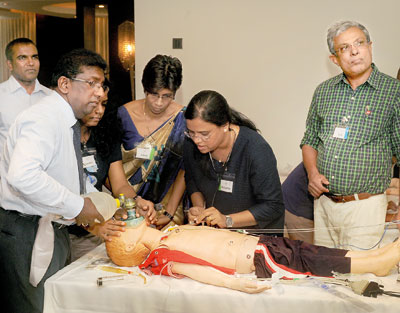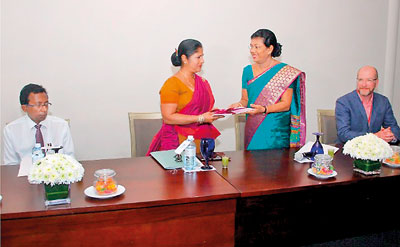News
Trail blazing ‘Sim Junior’ and ‘Sim B New’ open new chapter in paediatric care here

The medical team attending to Sim Junior while checking his vital signs. Pix by Amila Gamage
A busy scene is what we come upon recently. A ‘four-year-old’ in a red shirt and a black pair of trousers has been rushed in and the mother is wailing, while the medical team is clustered around the ‘boy’.
While the case history – how he has taken ill – is extracted from the distraught mother with difficulty, the team is busy examining ‘Sim Junior’ and taking on-the-spot decisions with regard to his condition.
Strangely, the scene is not in a hospital but at a Colombo hotel and ‘Sim Junior’ is a mannequin. The mother is role-playing but the doctors and nurses are for real. A de-briefing and discussion follow about what should have been and should not have been done.
This is a first in paediatrics in Sri Lanka — Simulation Workshops conducted by the Bristol Medical Simulation Centre of the United Kingdom (UK) in collaboration with the Sri Lanka College of Paediatricians (SLCP) under the leadership of President Dr. Ramya de Silva, with ‘Sim Junior’ as well as baby ‘Sim B New’ very much a part of it. Their names, interestingly, have been derived from ‘simulation’.
The Sunday Times team had ‘exclusive observer status’ at this three-day Master Trainers’ Workshop held in Colombo for Consultant Paediatricians, Neonatologists, Intensivists and Nurses. While the second workshop was held in Anuradhapura a follow-up workshop is scheduled for September at the premier Lady Ridgeway Hospital (LRH) for Children in Colombo.
The team which conducted the thorough training was led by Consultant Paediatric Intensivist and Director of the Bristol Paediatric Simulation Centre, Dr. David Grant who is also the Immediate Past President of the International Paediatric Simulation Society. His team comprised Dr. Maria Tsakmakis, Dr. Chrisantha Halahakoon and Specialist Nurse Claire Johnson. Another Master Trainers’ Workshop by Dr. Grant is due to be held in January next year (2017).
These processes have also seen the birth of the Paediatric Simulation Council of Sri Lanka, with Dr. de Silva being appointed Founder President and Dr. Grant its Patron.
“We introduced the latest method in medical teaching called Technology Enhanced Learning,” said Dr. de Silva explaining that it is basically the simulation of a real-life scenario. “It is a first in paediatrics and I undertook to launch this during my tenure as SLCP President and hope it will take off in the country.”

The KISS (Kids Simulation Training in Sri Lanka), according to Dr. de Silva, is an innovative collaborative venture between the Health Ministry and the SLCP, with much support from the Director-General of Health Services, Dr. Palitha Mahipala.
Along with simulation training, there are plans to build a National Training Centre for Skill Development in Paediatrics at the LRH next year. A section of this centre will be dedicated to the ‘Advanced Simulation Lab’ (Super Sim Centre) equipped with high-fidelity dolls possessing advanced technology.
Pointing out that recent changes in the culture of medical education have highlighted deficiencies in the traditional apprenticeship model of education, she says that we need to use modern education techniques and tools if we are to widen participation in learning and enhancing the learning environment for training and professional development.
‘Simulation’ refers to reproduction of a ‘real’ event, process or a set of conditions or problems. Learners are expected to evaluate and act in the same way as they would in the real situation, thereby supporting learning in a ‘patient-safe’ environment, as well as increasing competence by deliberate and repeated practice, she states.
High-fidelity simulators are life-like mannequins connected to computer systems that control the physiological and physical responses of the mannequin, the Sunday Times learns. The adoption of simulation technology is a departure from the traditional ‘see one, do one, teach one’ method of medical training, which for centuries, has relied upon real patients.
The benefits of simulation-based learning are: Learning can take place without exposing patients to risk; learning can take place at the speed of the learner; immediate feedback is available to the learner; learning can be adapted to the learner in a completely flexible way; and simulators have the potential to take the early and dangerous part of the learning curve away from patients and to accelerate learning.
Dr. de Silva added that the training in the first three years will be supported by the World Bank under ‘Innovative Projects’ of its Health Sector Development Project.
Adolescents Not forgotten too  Dr. Ramya de Silva presents the Manual on Adolescent Healthcare to Minister Chandrani Bandara, while SLCP’s President-elect Dr. LakKumar Fernando and Prof. Russell Viner look on. Not giving step-motherly treatment to adolescents, the SLCP also organized a comprehensive three-day Training of Trainers’ Workshop on their health while forming the Adolescent Health Forum. The Manual on Adolescent Healthcare was launched at the inauguration of the workshop and the first copy was handed over to Women’s and Children’s Affairs Minister, Chandrani Bandara, by SLCP President Dr. Ramya de Silva in the presence of LRH Director Dr. Kumara Wickremasinghe. Forty Consultants including Paediatricians, Gynaecologists, Psychiatrists and Community Physicians participated in this workshop conducted by three eminent Consultants from the UK, Prof. Russell Viner, Professor of Adolescent Health, University College London; Dr. Fiona Straw, Consultant Community Paediatrician, Nottingham Hospital; and Dr. William White, Consultant in Adolescent Medicine, University College London. The interactive sessions at the workshop dealt with the mental and sexual health of adolescents, transition of their care from Paediatricians to Physicians and much more. “Like the newborn, the adolescent is also marginalized. However, investing in adolescents’ health and development is key to improving their survival and wellbeing and critical for the success of the post-2015 development agenda,” stressed SLCP President Dr. de Silva. Sri Lanka has 3.35 million adolescents (10-19 years) comprising 16% of the population. Of them, about 70% are attending school, she said. This workshop was conducted in collaboration with the Royal College of Paediatrics and Child Health (RCPCH) which is headed by President Prof. Neena Modi. Meanwhile, the aim of the Adolescent Health Forum is to help establish Adolescent Clinics throughout the country to streamline their care.
|

